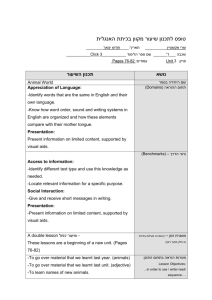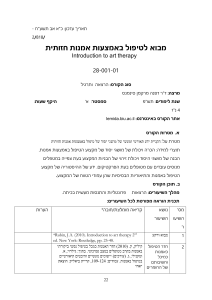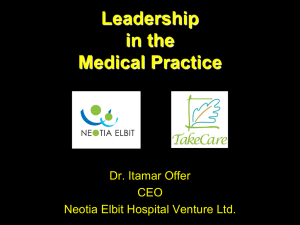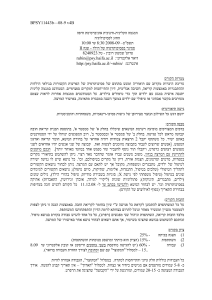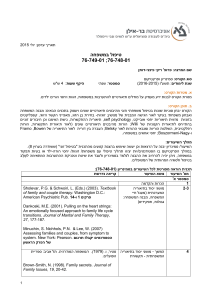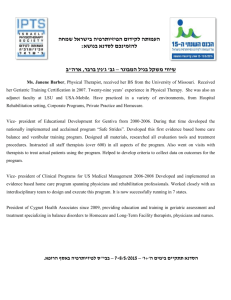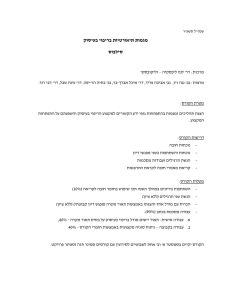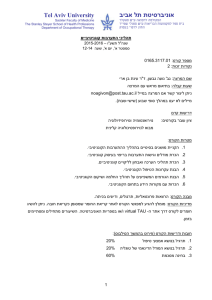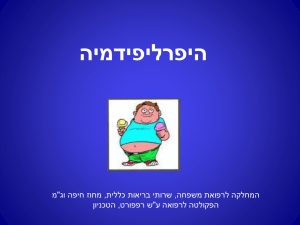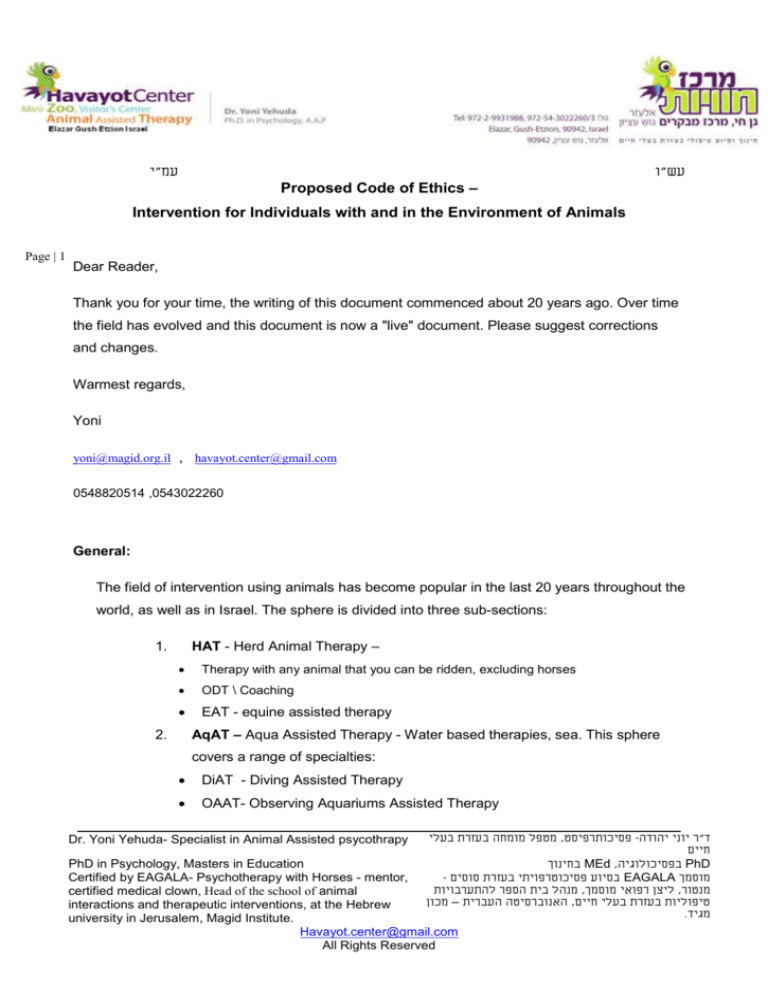
עמ"י
עש"ו
Proposed Code of Ethics –
Intervention for Individuals with and in the Environment of Animals
Page | 1
Dear Reader,
Thank you for your time, the writing of this document commenced about 20 years ago. Over time
the field has evolved and this document is now a "live" document. Please suggest corrections
and changes.
Warmest regards,
Yoni
yoni@magid.org.il , havayot.center@gmail.com
0548820514 ,0543022260
General:
The field of intervention using animals has become popular in the last 20 years throughout the
world, as well as in Israel. The sphere is divided into three sub-sections:
HAT - Herd Animal Therapy –
1.
Therapy with any animal that you can be ridden, excluding horses
ODT \ Coaching
EAT - equine assisted therapy
AqAT – Aqua Assisted Therapy - Water based therapies, sea. This sphere
2.
covers a range of specialties:
DiAT - Diving Assisted Therapy
OAAT- Observing Aquariums Assisted Therapy
Dr. Yoni Yehuda- Specialist in Animal Assisted psycothrapy
מטפל מומחה בעזרת בעלי, פסיכותרפיסט-ד"ר יוני יהודה
חיים
בחינוךMEd , בפסיכולוגיהPhD
- בסיוע פסיכוטרפויתי בעזרת סוסיםEAGALA מוסמך
מנהל בית הספר להתערבויות, ליצן רפואי מוסמך,מנטור
האנוברסיטה העברית – מכון,טיפוליות בעזרת בעלי חיים
.מגיד
PhD in Psychology, Masters in Education
Certified by EAGALA- Psychotherapy with Horses - mentor,
certified medical clown, Head of the school of animal
interactions and therapeutic interventions, at the Hebrew
university in Jerusalem, Magid Institute.
Havayot.center@gmail.com
All Rights Reserved
עמ"י
עש"ו
DAT - Dolphin assisted therapy
3. CAI - Canine Assisted Interventions - Interactions with the help of dogs. This
sphere covers a range of specialties:
Page | 2
CAT - Canine assisted therapy \ Dog Assisted Advisor/Activities/Assists
Service dog
Wolf pack
4. AA \ TI - Animal assisted \ Therapeutic Interventions - This sphere covers a
range of specialties:
AAA - Animal Assisted Advisor/Activities/Assists
AAE - Animal Assisted Education
AAT - Animal Assisted Therapy
AAP - Animal Assisted Psychotherapy/ Supervisor
The objective of this document is to include the types of workers actually interacting with
individuals using animals.
To provide ethical direction in each of the disciplines according to the professional training and
background of the therapist; each according to his rank, level and training in the field of animalassisted therapy. Throughout this document, for convenience, the word “therapist” or the
abbreviation AAT will be used but the text relates with equal applicability all Intervention for
Individuals with and in the Environment of Animals.
It is important to note that another objective of this document is to encourage and lead
research processes in the field of animal-assisted intervention.
The field of animal-assisted intervention with patients is a new and flourishing discipline. This
field develops and grows from a number of therapeutic fields: mental emotional, physio
metric, cognitive, physiological, body and mind \ soul elements. These fields within an
environment of animals create an impressive and riveting discipline that functions in a holistic
Dr. Yoni Yehuda- Specialist in Animal Assisted psycothrapy
מטפל מומחה בעזרת בעלי, פסיכותרפיסט-ד"ר יוני יהודה
חיים
בחינוךMEd , בפסיכולוגיהPhD
- בסיוע פסיכוטרפויתי בעזרת סוסיםEAGALA מוסמך
מנהל בית הספר להתערבויות, ליצן רפואי מוסמך,מנטור
האנוברסיטה העברית – מכון,טיפוליות בעזרת בעלי חיים
.מגיד
PhD in Psychology, Masters in Education
Certified by EAGALA- Psychotherapy with Horses - mentor,
certified medical clown, Head of the school of animal
interactions and therapeutic interventions, at the Hebrew
university in Jerusalem, Magid Institute.
Havayot.center@gmail.com
All Rights Reserved
עמ"י
עש"ו
perception of man, his needs and environment. Research material is being collected daily.
This research shows, without doubt, the sometimes unique contribution of animal-assisted
intervention with patients.
Page | 3
Introduction:
Throughout the world and in specific fields here in Israel, the following are the defined
fields of studies and their scope.
AAA - Activities, Therapy advisor, animal-assistance.
Training depends on background of the student and scope of learning:
Animal assisted activities – No requirement for previous background,
also appropriate for teenagers. Between 40-100 hours training.
Animal-assisted assistance – 12 years of study and between 250400 hours of training.
Animal assisted advisor – background in teaching, nursery schools,
education etc. - minimum 900 study hours with focus on the specific
area of the population receiving therapy (children and youth, elderly,
etc.).
AAE – Animal-Assisted Education – the programs are studied in colleges with
the intention to work in an educational institution. The program can be combined
with or follow an undergraduate degree. Between 500-1000 training hours (the
difference is in the institutions themselves).
AAT - Animal Assisted Therapy – mandatory undergraduate degree with
preference to holders of an undergraduate degree that is in therapy or who do a
redirection which includes completing introductory courses and introduction to
Dr. Yoni Yehuda- Specialist in Animal Assisted psycothrapy
מטפל מומחה בעזרת בעלי, פסיכותרפיסט-ד"ר יוני יהודה
חיים
בחינוךMEd , בפסיכולוגיהPhD
- בסיוע פסיכוטרפויתי בעזרת סוסיםEAGALA מוסמך
מנהל בית הספר להתערבויות, ליצן רפואי מוסמך,מנטור
האנוברסיטה העברית – מכון,טיפוליות בעזרת בעלי חיים
.מגיד
PhD in Psychology, Masters in Education
Certified by EAGALA- Psychotherapy with Horses - mentor,
certified medical clown, Head of the school of animal
interactions and therapeutic interventions, at the Hebrew
university in Jerusalem, Magid Institute.
Havayot.center@gmail.com
All Rights Reserved
עמ"י
עש"ו
psychology, psychopathology, personality doctrines and so forth. Scope of study is
between 1600-2000 hours. The ISSAT (International Society for Animal-Assisted
Therapy), has determined basic and fundamental fields of study that must be part
of these programs in order to justify a therapist’s certificate.
Page | 4
Animal Assisted Psychotherapist, Supervisor – undergraduate degree +
animal-assisted therapist certificate as explained above + 1000 hours’ treatment
and training in a recognized therapeutic program. Alternatively, a therapist
according to the definition in Therapists Law, and after accumulating field
experience and advanced studies in psychotherapy with animals of a minimum of
1500 hours. (Those who do not come with an animal-assisted therapist certificate
must complete this in addition to the 1500 hours).
HAT – Herd Animal Therapy.
Therapy with and around horses – worldwide prerequisites: preference for
holders of undergraduate degree in therapy / undergraduate degree + preparatory
courses and introductions to psychology etc. Between 1600-2000 hours’ training
(the difference is in the institutions themselves).
Work with and around a herd – prerequisites: teaching certificate / studies /
youth training / nursery school teacher / graduates of teachers’ seminars.
Minimum 900 hours training. Training focuses on target population requiring
therapy.
Therapy assisted by any animal that can be ridden, such as llamas, camels,
donkeys etc. – prerequisites: teaching certificate / studies / youth training /
nursery school teacher / graduates of teachers’ seminars. Minimum 900 hours
training. Training focuses on target population requiring therapy.
Dr. Yoni Yehuda- Specialist in Animal Assisted psycothrapy
מטפל מומחה בעזרת בעלי, פסיכותרפיסט-ד"ר יוני יהודה
חיים
בחינוךMEd , בפסיכולוגיהPhD
- בסיוע פסיכוטרפויתי בעזרת סוסיםEAGALA מוסמך
מנהל בית הספר להתערבויות, ליצן רפואי מוסמך,מנטור
האנוברסיטה העברית – מכון,טיפוליות בעזרת בעלי חיים
.מגיד
PhD in Psychology, Masters in Education
Certified by EAGALA- Psychotherapy with Horses - mentor,
certified medical clown, Head of the school of animal
interactions and therapeutic interventions, at the Hebrew
university in Jerusalem, Magid Institute.
Havayot.center@gmail.com
All Rights Reserved
עמ"י
עש"ו
Therapeutic riding instructor currently in Israel – 300 - 900 hours’ training –
There are very good recommendations from the professional committee for
therapeutic riding to examine in depth the student’s academic background.
Page | 5
CAI - Canine Assisted Interventions - Interactions with the help of dogs:
DAA – Dog Assisted Advisor / activities / assistance-dog instructor therapy
guide (assistance / activity / advisor). Background of the trainees, scope of
hours of training and content, they are not uniform, in practice between 40-900
hours. The professional committee for therapeutic dog handling in Israel is
redefining credentials at the moment.
Training courses worldwide are similar to those detailed above, with regard to
AAP, AAT, AAE and AAA.
AqAT – Aqua Therapy:
Training courses worldwide are similar to those detailed above, with regard to
AAP. AAT, AAE and AAA.
In Israel there is only one training program at the dolphin reef in Eilat - details can
be found at the reef’s site.
Ethics, Basic Definitions and Rules:
1. An Animal-assisted therapist is one who meets the professional requirements for
accreditation determined by the ISAAT (International Society for Animal-Assisted
Therapy), according to the vision set forth by the IAHAIO (International Association of
Human-Animal Interaction), and with the aspiration that there will soon be official
recognition from the government of the State of Israel.
2. Training of therapists in the field must include the following areas:
Dr. Yoni Yehuda- Specialist in Animal Assisted psycothrapy
מטפל מומחה בעזרת בעלי, פסיכותרפיסט-ד"ר יוני יהודה
חיים
בחינוךMEd , בפסיכולוגיהPhD
- בסיוע פסיכוטרפויתי בעזרת סוסיםEAGALA מוסמך
מנהל בית הספר להתערבויות, ליצן רפואי מוסמך,מנטור
האנוברסיטה העברית – מכון,טיפוליות בעזרת בעלי חיים
.מגיד
PhD in Psychology, Masters in Education
Certified by EAGALA- Psychotherapy with Horses - mentor,
certified medical clown, Head of the school of animal
interactions and therapeutic interventions, at the Hebrew
university in Jerusalem, Magid Institute.
Havayot.center@gmail.com
All Rights Reserved
עמ"י
עש"ו
Working with animals, with significant understanding of training the animals and
taming them so that they are suited for work in a human environment – as part of a
natural process and in a manner that does not affect the animals’ wellbeing. It is
not enough to place attention on the life of the animal; quality of life is also
Page | 6
important, as is the safeguarding of its freedom, while adopting at all times a
respectful approach to the animals and not simply regarding them as a resource.
The area of animal welfare must have the highest priority in the mind of the
therapist. Therefore, he needs to learn how to work with the animal. The animal
must not be subjected to force to make it do “work” that it does not want to do.
The field of psychotherapeutic activity in an animal environment.
The field of physio motoric in an animal environment.
The field of cognitive work.
3. The Animal-assisted therapist must be aware of his responsibilities and duties, and
adhere to the regulations set forth in this document.
4. The Animal-Assisted Therapist must conform to the laws of the country in which he
operates, with regard to working in the fields of mental health and welfare, education and
rehabilitation, and in accordance with the Animal Welfare Law and its derivatives. This
includes laws relating to the protection of wild animals and their derivatives, and any other
regulations relating to the raising of pets.
5. The patient must not be permitted to harm the animal in any way whatsoever. Should a
patient maim or even kill an animal, the therapist must act according to the needs of the
patient with regards to the specific incident and, of course, follow all guidelines set forth by
the Ministry of Health and other relevant entities.
6. The Animal-Assisted Therapist must diagnose, treat and advise only in the field of his
expertise and in accordance with his training and the experience he has accumulated in
Dr. Yoni Yehuda- Specialist in Animal Assisted psycothrapy
מטפל מומחה בעזרת בעלי, פסיכותרפיסט-ד"ר יוני יהודה
חיים
בחינוךMEd , בפסיכולוגיהPhD
- בסיוע פסיכוטרפויתי בעזרת סוסיםEAGALA מוסמך
מנהל בית הספר להתערבויות, ליצן רפואי מוסמך,מנטור
האנוברסיטה העברית – מכון,טיפוליות בעזרת בעלי חיים
.מגיד
PhD in Psychology, Masters in Education
Certified by EAGALA- Psychotherapy with Horses - mentor,
certified medical clown, Head of the school of animal
interactions and therapeutic interventions, at the Hebrew
university in Jerusalem, Magid Institute.
Havayot.center@gmail.com
All Rights Reserved
עמ"י
עש"ו
the field. Upon meeting patients or their guardians he must inform them of his relevant
education, skills, specialization and experience.
7. The animal-assisted therapist must act with integrity and dignity towards patients and
Page | 7
other professionals. When acting as part of a multi-disciplinary team, the animal assisted
therapist must cooperate with other therapists and professionals for the good of the
patient. He must avoid any disparagement of others and show no bias based on age,
race, gender or religion.
8. The Animal-assisted therapists must accept wholeheartedly the complexity and disparity
of patients and their views. They must avoid forcing their personal beliefs and work
methods with different animals on their patients. The Animal-assisted therapists must
broaden their familiarity with as many cultures, traditions, religions and faiths as possible,
with the understanding that such knowledge may prove beneficial to patients during
sessions. The Therapists must be aware of their convictions, opinions, and biases, as well
as those of their patients, before taking on the responsibility of treatment. Furthermore,
therapists must be aware of the possible effects of therapy and the relationship dynamic
with the animals they employ. The Therapists must understand the cultural significance
and symbolism of the animals they work with.
9. The Animal-Assisted Therapist must refrain from taking advantage of his position to the
detriment of his patients.
10. The Animal-assisted therapists must document sessions and summarize them
professionally for when documentation and updates are necessary. The reporting process
will be conducted in such a way as to maintain patient-therapist confidentiality, with use of
personal discretion and judgment.
11. The Animal-Assisted Therapist must maintain professional contact in the form of training,
supervision, consulting and diagnostics with professionals in the field of mental health,
welfare, education and rehabilitation and the fields of veterinary care and animal behavior,
in accordance with the setting and population with which he works.
Dr. Yoni Yehuda- Specialist in Animal Assisted psycothrapy
מטפל מומחה בעזרת בעלי, פסיכותרפיסט-ד"ר יוני יהודה
חיים
בחינוךMEd , בפסיכולוגיהPhD
- בסיוע פסיכוטרפויתי בעזרת סוסיםEAGALA מוסמך
מנהל בית הספר להתערבויות, ליצן רפואי מוסמך,מנטור
האנוברסיטה העברית – מכון,טיפוליות בעזרת בעלי חיים
.מגיד
PhD in Psychology, Masters in Education
Certified by EAGALA- Psychotherapy with Horses - mentor,
certified medical clown, Head of the school of animal
interactions and therapeutic interventions, at the Hebrew
university in Jerusalem, Magid Institute.
Havayot.center@gmail.com
All Rights Reserved
עמ"י
עש"ו
12. The therapist must maintain a high professional standard and keep himself updated of
developments and innovations in his field.
13. The Animal-Assisted Therapist must know when to terminate a treatment relationship in a
Page | 8
proper and timely manner and to assist the patient in moving to another therapist should
this be required.
14. Animal-assisted therapists must be aware of circumstances requiring the termination of
their work with a patient, and/or the transition to other therapists, due to personal
constraints relating to their own personal history, to any inability to deal with the patient, or
to any other difficulty that may arise.
15. It is not recommended to treat patients that therapists are connected to, either through
familial, social or economic ties. Also, it is not recommended to treat [one’s] students for
at least two years after they have completed therapy studies. In such cases when therapy
is initiated with someone close to the therapist, this fact must be included in the therapy
contract.
16. The Supervisor of the Animal-Assisted Therapist is someone who has come from the
mental health field and has undergone training to become a senior therapist/trainer or an
Animal-Assisted Therapist who has undergone training that certifies him to work as a
supervisor in an AAT program.
17. Individuals involved in supervision and instruction:
Must refrain from taking advantage of their status to influence those under their
guidance and internship.
Must refrain from establishing a therapeutic relationship with their trainees,
students and interns, unless another contract has been created with the
agreement of both the parties.
The Animal-Assisted Therapist involved in teaching and training must nurture the
professional development of his interns and trainees, over time. He must provide a
personal example in the spheres of compliance with ethical guidelines,
Dr. Yoni Yehuda- Specialist in Animal Assisted psycothrapy
מטפל מומחה בעזרת בעלי, פסיכותרפיסט-ד"ר יוני יהודה
חיים
בחינוךMEd , בפסיכולוגיהPhD
- בסיוע פסיכוטרפויתי בעזרת סוסיםEAGALA מוסמך
מנהל בית הספר להתערבויות, ליצן רפואי מוסמך,מנטור
האנוברסיטה העברית – מכון,טיפוליות בעזרת בעלי חיים
.מגיד
PhD in Psychology, Masters in Education
Certified by EAGALA- Psychotherapy with Horses - mentor,
certified medical clown, Head of the school of animal
interactions and therapeutic interventions, at the Hebrew
university in Jerusalem, Magid Institute.
Havayot.center@gmail.com
All Rights Reserved
עמ"י
עש"ו
professional standards and interpersonal relationships that does credit to the
profession and his patients.
18. The Animal-Assisted Therapist working in a public organization or setting, must operate in
Page | 9
accordance with the regulations:
The Animal-Assisted Therapist working in a public organization may not work
privately in the same setting and/or with the same patients, unless he receives a
special permit to do so from the abovementioned public organization.
The therapist must allow for a one-year cooling off period between working as a
therapist in a public organization and continuing in a personal capacity unless
authorized to do so via a special contract that justifies directly continuing
treatment.
19. The Animal-Assisted Therapist must be well acquainted with the variety of animals with
which he works: lifestyle in natural and captive environments, body language, diet,
maintenance, habitat, husbandry, reproduction, classification, and human-animal
interactions.
20. The Animal-Assisted Therapist must raise the animal in a manner that allows it a high
quality of life based on knowledge and studies of the animal; to meet its social needs, so
that it is able to achieve its natural lifestyle.
21. The animal-assisted therapist must be aware of the character of the animal, its general
abilities and limitations and how to handle it. He must work with consideration for the
needs of the animal; out of the knowledge that he is responsible for the quality of life and
welfare of the animal, who has rights.
22. Many studies have been conducted about the advantages of raising pets, but not all pets
can become a therapeutic animal.
23. Because of our respect for animals, we must refrain from paternalistic traits as much as
possible. [Veterinary medicine also has to grapple with this complex issue]. At the same
time, it is clear that raising the animal in a proper and respectable manner that protects it
from predators, provides it with excellent food, prevents illnesses and offers medical
Dr. Yoni Yehuda- Specialist in Animal Assisted psycothrapy
מטפל מומחה בעזרת בעלי, פסיכותרפיסט-ד"ר יוני יהודה
חיים
בחינוךMEd , בפסיכולוגיהPhD
- בסיוע פסיכוטרפויתי בעזרת סוסיםEAGALA מוסמך
מנהל בית הספר להתערבויות, ליצן רפואי מוסמך,מנטור
האנוברסיטה העברית – מכון,טיפוליות בעזרת בעלי חיים
.מגיד
PhD in Psychology, Masters in Education
Certified by EAGALA- Psychotherapy with Horses - mentor,
certified medical clown, Head of the school of animal
interactions and therapeutic interventions, at the Hebrew
university in Jerusalem, Magid Institute.
Havayot.center@gmail.com
All Rights Reserved
עמ"י
עש"ו
treatment, reduces the danger from accidents, injury or fighting with other animals, long
life in leisure and peaceful circumstances – all under the responsibility of the AnimalAssisted Therapist – morally justifies the keeping of an animal in captivity.
Page | 10
24. It is known that there are animals such as the Syrian hamster that have become extinct in
the wild, and others, such as the chinchilla that are in danger of extinction. Raising them
in captivity ensures their species’ continuation, which is certainly appropriate as they are
assisting therapists in their work.
25. Injured and rehabilitated animals, that live and are raised in a human environment, can be
worked with for therapy purposes. This unique relationship contributes greatly to both the
animals and to patients with a variety of handicaps, and is therefore recommended.
26. The Animal-Assisted Therapist needs to be aware of the uniqueness of this therapy,
which derives from the very presence of the animals in therapy. The encounter with the
animal facilitates different therapeutic relationships. The animal should be viewed as an
autonomous entity that we are assisted by and work with. As detailed in PhD Y. Yehuda’s
model: “Therapeutic Triangles - Psychotherapeutic Implementations Assisted by Animals”:
The unique attributes of animals as living, thinking, feeling and creative beings,
influence the development and dynamics of therapy.
Animals allow and invite for the establishment of physical contact.
Animals accelerate and enable establishment of connection.
Animals create and enable experiences, emotions and feelings.
The animals and their environment allow for transference in different spheres of
life.
Animals allow for the establishing of elements of self-identity and distinguishing
between the self and the environment.
Animals assist in developing empathy and caring for others.
Animals reflect our preoccupation with primary needs, such as feeding, love,
inclusion, maintenance, cleanliness and others.
Animals allow adults and teens to re-experience childhood.
Dr. Yoni Yehuda- Specialist in Animal Assisted psycothrapy
מטפל מומחה בעזרת בעלי, פסיכותרפיסט-ד"ר יוני יהודה
חיים
בחינוךMEd , בפסיכולוגיהPhD
- בסיוע פסיכוטרפויתי בעזרת סוסיםEAGALA מוסמך
מנהל בית הספר להתערבויות, ליצן רפואי מוסמך,מנטור
האנוברסיטה העברית – מכון,טיפוליות בעזרת בעלי חיים
.מגיד
PhD in Psychology, Masters in Education
Certified by EAGALA- Psychotherapy with Horses - mentor,
certified medical clown, Head of the school of animal
interactions and therapeutic interventions, at the Hebrew
university in Jerusalem, Magid Institute.
Havayot.center@gmail.com
All Rights Reserved
עמ"י
עש"ו
Animals represent, facilitate and reflect passion, sexuality, aggression and so
forth.
Animals and time spent with them allow for experiences of success, feelings of
capability and a sense of control.
Page | 11
Animals permit compensatory and corrective experiences for deprivation and
negative experiences from the past.
Animals can be helpful in encouraging the forces of ego–adaptation, discipline and
self-control.
27. The animal-assisted therapist must take into account the medical, psychiatric,
neurological and/or psychological state of the patient in his work with him.
28. The animal-assisted therapist must adapt the therapeutic setting, resources and treatment
methods with the specific needs of the patient. The therapeutic setting must be a safe
environment. The therapy environment should be suited to the physical, emotional,
cognitive, etc. needs and limitations of the patient. The Animal-Assisted Therapist needs
to be particularly vigilant regarding any possible change during the meeting and he must
react immediately in a way that adjusts to the change.
29. The animal-assisted therapist must use professional discretion when deciding on the
appropriate animal for therapy: adapting methods to therapy goals, personal adaptations
due to considerations of age, developmental stage, motor skills, the cognitive and
emotional state of the patient, and adjustment to the work environment.
30. The Animal-Assisted Therapist must draft a therapy contract before beginning treatment.
The contract will include treatment conditions, mutual responsibility, meeting schedule,
information regarding the therapy with animals, information about therapist-patient
confidentiality and the obligation to report, etc.
31. The Animal-Assisted Therapist must work in the best interests of his patients and use
therapeutic intervention methods that address their needs. He must adapt the setting and
therapy contract with understanding and mutual agreement.
Dr. Yoni Yehuda- Specialist in Animal Assisted psycothrapy
מטפל מומחה בעזרת בעלי, פסיכותרפיסט-ד"ר יוני יהודה
חיים
בחינוךMEd , בפסיכולוגיהPhD
- בסיוע פסיכוטרפויתי בעזרת סוסיםEAGALA מוסמך
מנהל בית הספר להתערבויות, ליצן רפואי מוסמך,מנטור
האנוברסיטה העברית – מכון,טיפוליות בעזרת בעלי חיים
.מגיד
PhD in Psychology, Masters in Education
Certified by EAGALA- Psychotherapy with Horses - mentor,
certified medical clown, Head of the school of animal
interactions and therapeutic interventions, at the Hebrew
university in Jerusalem, Magid Institute.
Havayot.center@gmail.com
All Rights Reserved
עמ"י
עש"ו
32. The Animal-Assisted Therapist must care for the emotional welfare of the patient when in
the presence of animals: Patients may not be forced or coerced into encountering or
touching animals they do not wish to see or touch, excluding special circumstances in
Page | 12
which such methods are agreed upon and where the agreement of the patient has been
given ahead of time as part of the therapeutic process. The therapeutic setting must allow
for free and protected movement for patients and animals alike. During sessions, the
therapist must remain alert to any change or process in the patient’s stance towards the
animal, or vice versa.
33. The Animal-Assisted Therapist must care for the physical and emotional welfare of the
patient when in the presence of animals:
During the data collection process (anamnesis), it is essential to ensure there is no
allergy or sensitivity to animals, their secretions and their food. On occasion,
consideration should be given to obtaining approval from the personal physician of
the patient or a referral / health status evaluation signed by the doctor. If it is found
that the patient has an immune failure for whatever reason, such as young age,
old-age, cancer, or AIDS, head injury, motoric deficiency, etc., an explicit approval
should be received from a qualified doctor in the specific area concerned. If no
specific written approval is received, the patient or his representative must be
informed of the risks and the therapist must discontinue the therapy.
During the meeting with the patient, the Animal-Assisted Therapist must be alert to
possible signs of distress, the appearance of any allergy and sensitivity to animals,
their secretions and their food. A patient must not be allowed to perform any act
that may endanger him or cause him possible injury, either from the animals or
from any accompanying accessories, without first receiving instruction on the
anticipated dangers. The patient may not be exposed to sick animals suffering
from zoonotic diseases. Furthermore, patients may not be exposed to aggressive
animals or those unfamiliar with human contact or closeness thereof. The therapist
may work only with those animals he is familiar with.
Dr. Yoni Yehuda- Specialist in Animal Assisted psycothrapy
מטפל מומחה בעזרת בעלי, פסיכותרפיסט-ד"ר יוני יהודה
חיים
בחינוךMEd , בפסיכולוגיהPhD
- בסיוע פסיכוטרפויתי בעזרת סוסיםEAGALA מוסמך
מנהל בית הספר להתערבויות, ליצן רפואי מוסמך,מנטור
האנוברסיטה העברית – מכון,טיפוליות בעזרת בעלי חיים
.מגיד
PhD in Psychology, Masters in Education
Certified by EAGALA- Psychotherapy with Horses - mentor,
certified medical clown, Head of the school of animal
interactions and therapeutic interventions, at the Hebrew
university in Jerusalem, Magid Institute.
Havayot.center@gmail.com
All Rights Reserved
עמ"י
עש"ו
Should the animal harm the patient, therapists must adhere to Heath Ministry
protocols while providing first aid treatment according to type of injury, reporting
the incident to those responsible for the patient, and referring the patient for further
Page | 13
medical attention (validity of tetanus vaccine and/or other treatments). A report
must be filed and distributed to relevant authorized personal in compliance with
the law, according to the type of injury.
34. Animal-assisted sessions normally facilitate physical and emotional intimacy between the
three points of the therapeutic triangle - patient, animal, and therapist since the presence
of live animals may awaken the need for touch. Working with animals simply because
they are living creatures with basic urges, connects the patient, to a large extent, with
basic urges and physical closeness. The job of the therapist is to establish clear goals to
distinguish between demonstrations of closeness and those of sexual behavior. This
should be done while establishing an intimate relationship that is significant to the
therapeutic process and to the personal development of the patient.
35. In cases where physical contact between patients and therapists is necessary, such as
motor disabilities, aversion, distress, the need for soothing etc., the conditions for such
contact must be specified in the therapeutic contract. If cases of unnecessary contact
occur because of a mishap, such as transferring the animal or equipment from hand to
hand, or in emergency situations when a risk is posed to either patient or animal, the
therapist must discuss this with a supervisor and afterwards with the patient.
36. Animals are living, instinctual creatures that tangibly demonstrate such aspects of life as
parenthood, birthing, nursing, sexuality, mating, intimacy, violence, etc. On the one hand,
this provides a wonderful opportunity to advance the therapeutic process. On the other, it
may pose a difficulty for some patients. Therefore, therapists must give careful thought
and take into consideration the specifics of each case, according to the patient and the
situation as to whether to allow proximity to charged or sexually-related memories or
experiences. This must be discussed and thought through with the supervisor, and later
with the patient.
Dr. Yoni Yehuda- Specialist in Animal Assisted psycothrapy
מטפל מומחה בעזרת בעלי, פסיכותרפיסט-ד"ר יוני יהודה
חיים
בחינוךMEd , בפסיכולוגיהPhD
- בסיוע פסיכוטרפויתי בעזרת סוסיםEAGALA מוסמך
מנהל בית הספר להתערבויות, ליצן רפואי מוסמך,מנטור
האנוברסיטה העברית – מכון,טיפוליות בעזרת בעלי חיים
.מגיד
PhD in Psychology, Masters in Education
Certified by EAGALA- Psychotherapy with Horses - mentor,
certified medical clown, Head of the school of animal
interactions and therapeutic interventions, at the Hebrew
university in Jerusalem, Magid Institute.
Havayot.center@gmail.com
All Rights Reserved
עמ"י
עש"ו
37. Regarding sexuality between therapist and patient:
As with every therapist, the Animal-Assisted Therapist is bound by the following
regulations:
Page | 14
Therapists may not have any sexual involvement with patients and/or students.
Therapists may not have any erotic involvement with patients and/or students.
Therapists may not be undressed in the presence of patients and/or students.
Therapists may not permit patients to undress in their presence.
Therapists may not have any sexual involvement with former patients after
completion of therapy.
Therapists must take care to discourage and avoid any inappropriate intimacies
that may result from distorted views on intimacy from patients, themselves or
both.
With humble and pure praise to God, the creator of the world.
Dr. Yoni Yehuda- Specialist in Animal Assisted psycothrapy
מטפל מומחה בעזרת בעלי, פסיכותרפיסט-ד"ר יוני יהודה
חיים
בחינוךMEd , בפסיכולוגיהPhD
- בסיוע פסיכוטרפויתי בעזרת סוסיםEAGALA מוסמך
מנהל בית הספר להתערבויות, ליצן רפואי מוסמך,מנטור
האנוברסיטה העברית – מכון,טיפוליות בעזרת בעלי חיים
.מגיד
PhD in Psychology, Masters in Education
Certified by EAGALA- Psychotherapy with Horses - mentor,
certified medical clown, Head of the school of animal
interactions and therapeutic interventions, at the Hebrew
university in Jerusalem, Magid Institute.
Havayot.center@gmail.com
All Rights Reserved


